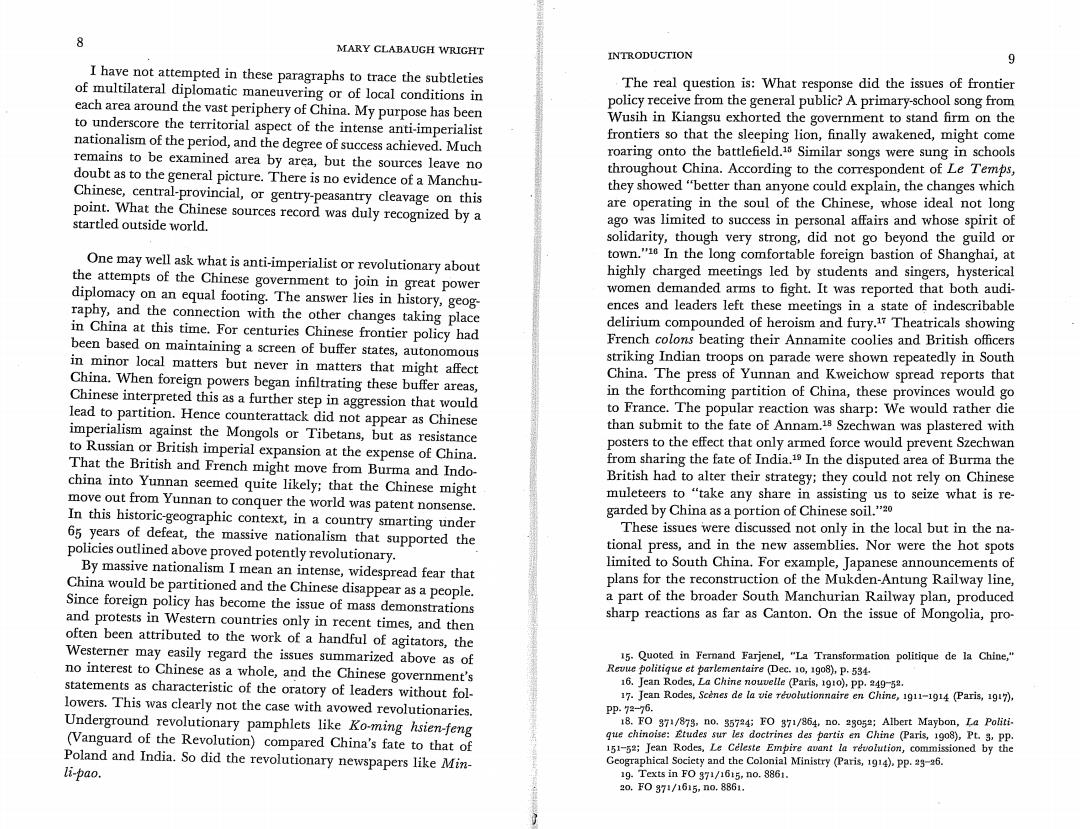
8 MARY CLABAUGH WRIGHT INTRODUCTION 9 I have not attempted in these paragraphs to trace the subtleties of multilateral diplomatic maneuvering or of local conditions in The real question is:What response did the issues of frontier each area around the vast periphery of China.My purpose has been policy receive from the general public?A primary-school song from to underscore the territorial aspect of the intense anti-imperialist Wusih in Kiangsu exhorted the government to stand firm on the nationalism of the period,and the degree of success achieved.Much frontiers so that the sleeping lion,finally awakened,might come remains to be examined area by area,but the sources leave no roaring onto the battlefield.1 Similar songs were sung in schools doubt as to the general picture.There is no evidence of a Manchu- throughout China.According to the correspondent of Le Temps, Chinese,central-provincial,or gentry-peasantry cleavage on this they showed "better than anyone could explain,the changes which point.What the Chinese sources record was duly recognized by a are operating in the soul of the Chinese,whose ideal not long startled outside world. ago was limited to success in personal affairs and whose spirit of solidarity,though very strong,did not go beyond the guild or One may well ask what is anti-imperialist or revolutionary about town."1 In the long comfortable foreign bastion of Shanghai,at the attempts of the Chinese government to join in great power highly charged meetings led by students and singers,hysterical diplomacy on an equal footing.The answer lies in history,geog women demanded arms to fight.It was reported that both audi- raphy,and the connection with the other changes taking place ences and leaders left these meetings in a state of indescribable in China at this time.For centuries Chinese frontier policy had delirium compounded of heroism and fury.1 Theatricals showing been based on maintaining a screen of buffer states,autonomous French colons beating their Annamite coolies and British officers in minor local matters but never in matters that might affect striking Indian troops on parade were shown repeatedly in South China.When foreign powers began infiltrating these buffer areas, China.The press of Yunnan and Kweichow spread reports that Chinese interpreted this as a further step in aggression that would in the forthcoming partition of China,these provinces would go lead to partition.Hence counterattack did not appear as Chinese to France.The popular reaction was sharp:We would rather die imperialism against the Mongols or Tibetans,but as resistance than submit to the fate of Annam.18 Szechwan was plastered with to Russian or British imperial expansion at the expense of China. posters to the effect that only armed force would prevent Szechwan That the British and French might move from Burma and Indo- from sharing the fate of India.19 In the disputed area of Burma the china into Yunnan seemed quite likely;that the Chinese might British had to alter their strategy;they could not rely on Chinese move out from Yunnan to conquer the world was patent nonsense. muleteers to "take any share in assisting us to seize what is re- In this historic-geographic context,in a country smarting under garded by China as a portion of Chinese soil."20 65 years of defeat,the massive nationalism that supported the These issues were discussed not only in the local but in the na- policies outlined above proved potently revolutionary tional press,and in the new assemblies.Nor were the hot spots By massive nationalism I mean an intense,widespread fear that limited to South China.For example,Japanese announcements of China would be partitioned and the Chinese disappear as a people. plans for the reconstruction of the Mukden-Antung Railway line, Since foreign policy has become the issue of mass demonstrations a part of the broader South Manchurian Railway plan,produced and protests in Western countries only in recent times,and then sharp reactions as far as Canton.On the issue of Mongolia,pro- often been attributed to the work of a handful of agitators,the Westerner may easily regard the issues summarized above as of 15.Quoted in Fernand Farjenel,"La Transformation politique de la Chine," no interest to Chinese as a whole,and the Chinese government's Revue politique et parlementaire Dec.10,1908),p.534. statements as characteristic of the oratory of leaders without fol- 16.Jean Rodes,La Chine nouvelle (Paris,1910),Pp.49-5. lowers.This was clearly not the case with avowed revolutionaries. 17.Jean Rodes,Scenes de la vie rdvolutionnaire en Chine,1911-1914 (Paris,1917), Pp.72-76. Underground revolutionary pamphlets like Ko-ming hsien-feng 18.FO 371/873.no.35724;FO B71/864.no.28052;Albert Maybon,La Politi. (Vanguard of the Revolution)compared China's fate to that of que chinoise:Etudes sur les doctrines des partis en Chine (Paris,1908),Pt.3,pp. Poland and India.So did the revolutionary newspapers like Min- 151-52;Jean Rodes,Le Celeste Empire avant la revolution,commissioned by the Geographical Socicty and the Colonial Ministry (Paris,1914).pp.-6. li-pao. 1g.Texts in F0371/615,no.8861. 20.F0371/1615,n0.8861
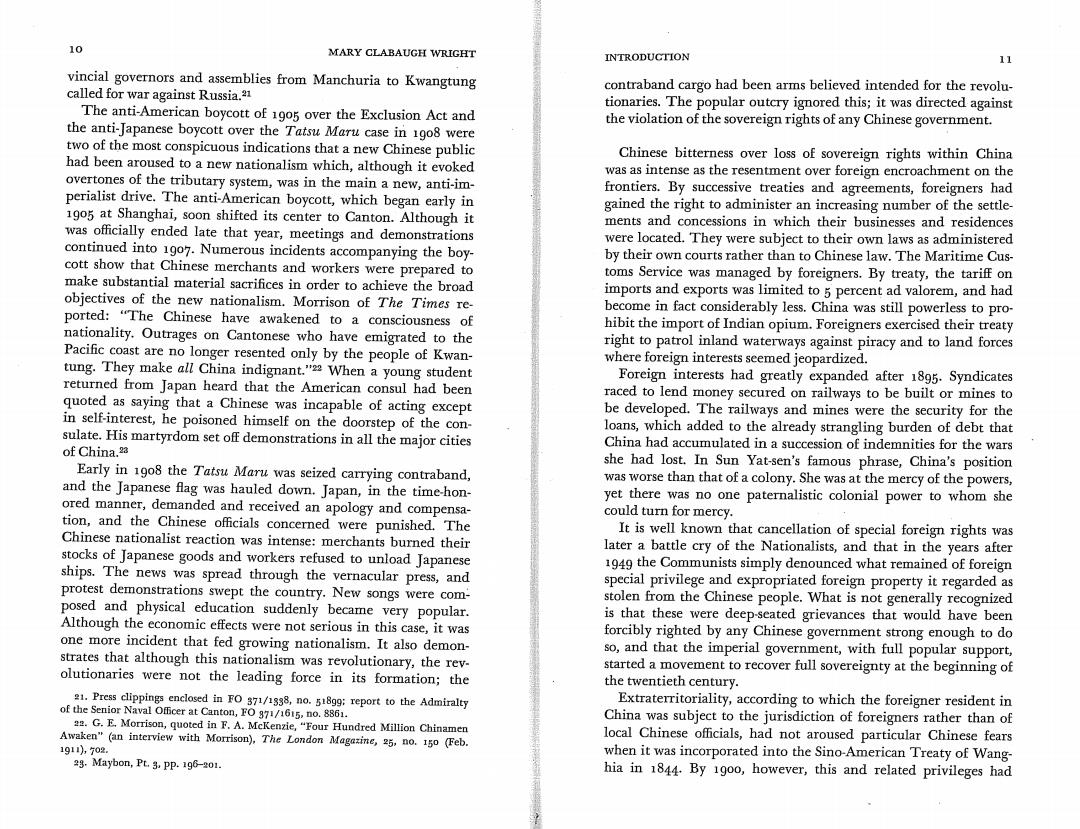
10 MARY CLABAUGH WRIGHT INTRODUCTION 11 vincial governors and assemblies from Manchuria to Kwangtung called for war against Russia. contraband cargo had been arms believed intended for the revolu- The anti-American boycott of 1905 over the Exclusion Act and tionaries.The popular outcry ignored this;it was directed against the anti-Japanese boycott over the Tatsu Maru case in 1908 were the violation of the sovereign rights of any Chinese government. two of the most conspicuous indications that a new Chinese public had been aroused to a new nationalism which,although it evoked Chinese bitterness over loss of sovereign rights within China overtones of the tributary system,was in the main a new,anti-im- was as intense as the resentment over foreign encroachment on the perialist drive.The anti-American boycott,which began early in frontiers.By successive treaties and agreements,foreigners had 1905 at Shanghai,soon shifted its center to Canton.Although it gained the right to administer an increasing number of the settle- ments and concessions in which their businesses and residences was officially ended late that year,meetings and demonstrations continued into 1907.Numerous incidents accompanying the boy- were located.They were subject to their own laws as administered by their own courts rather than to Chinese law.The Maritime Cus- cott show that Chinese merchants and workers were prepared to make substantial material sacrifices in order to achieve the broad toms Service was managed by foreigners.By treaty,the tariff on objectives of the new nationalism.Morrison of The Times re- imports and exports was limited to 5 percent ad valorem,and had ported:"The Chinese have awakened to a consciousness of become in fact considerably less.China was still powerless to pro- nationality.Outrages on Cantonese who have emigrated to the hibit the import of Indian opium.Foreigners exercised their treaty Pacific coast are no longer resented only by the people of Kwan- right to patrol inland waterways against piracy and to land forces tung.They make all China indignant."22 When a young student where foreign interests seemed jeopardized. returned from Japan heard that the American consul had been Foreign interests had greatly expanded after 1895.Syndicates quoted as saying that a Chinese was incapable of acting except raced to lend money secured on railways to be built or mines to in self-interest,he poisoned himself on the doorstep of the con- be developed.The railways and mines were the security for the sulate.His martyrdom set off demonstrations in all the major cities loans,which added to the already strangling burden of debt that of China.2 China had accumulated in a succession of indemnities for the wars Early in 19o8 the Tatsu Maru was seized carrying contraband, she had lost.In Sun Yat-sen's famous phrase,China's position and the Japanese flag was hauled down.Japan,in the time-hon- was worse than that of a colony.She was at the mercy of the powers, ored manner,demanded and received an apology and compensa- yet there was no one paternalistic colonial power to whom she tion,and the Chinese officials concerned were punished.The could turn for mercy. Chinese nationalist reaction was intense:merchants burned their It is well known that cancellation of special foreign rights was stocks of Japanese goods and workers refused to unload Japanese later a battle cry of the Nationalists,and that in the years after ships.The news was spread through the vernacular press,and 1949 the Communists simply denounced what remained of foreign protest demonstrations swept the country.New songs were com- special privilege and expropriated foreign property it regarded as posed and physical education suddenly became very popular. stolen from the Chinese people.What is not generally recognized Although the economic effects were not serious in this case,it was is that these were deep-seated grievances that would have been one more incident that fed growing nationalism.It also demon- forcibly righted by any Chinese government strong enough to do strates that although this nationalism was revolutionary,the rev- so,and that the imperial government,with full popular support, olutionaries were not the leading force in its formation;the started a movement to recover full sovereignty at the beginning of the twentieth century. 21.Press clippings enclosed in FO 371/1838,no.518gg:report to the Admiralty Extraterritoriality,according to which the foreigner resident in of the Senior Naval Officer at Canton,FO 971/1615,no.8861. 22.G.E.Morrison,quoted in F.A.McKenzie,"Four Hundred Million Chinamen China was subject to the jurisdiction of foreigners rather than of Awaken"(an interview with Morrison).The London Magazine,25,no.150 (Feb. local Chinese officials,had not aroused particular Chinese fears 191),702. when it was incorporated into the Sino-American Treaty of Wang- 28.Maybon,Pt.3.Pp.196-201. hia in 1844.By 1goo,however,this and related privileges had
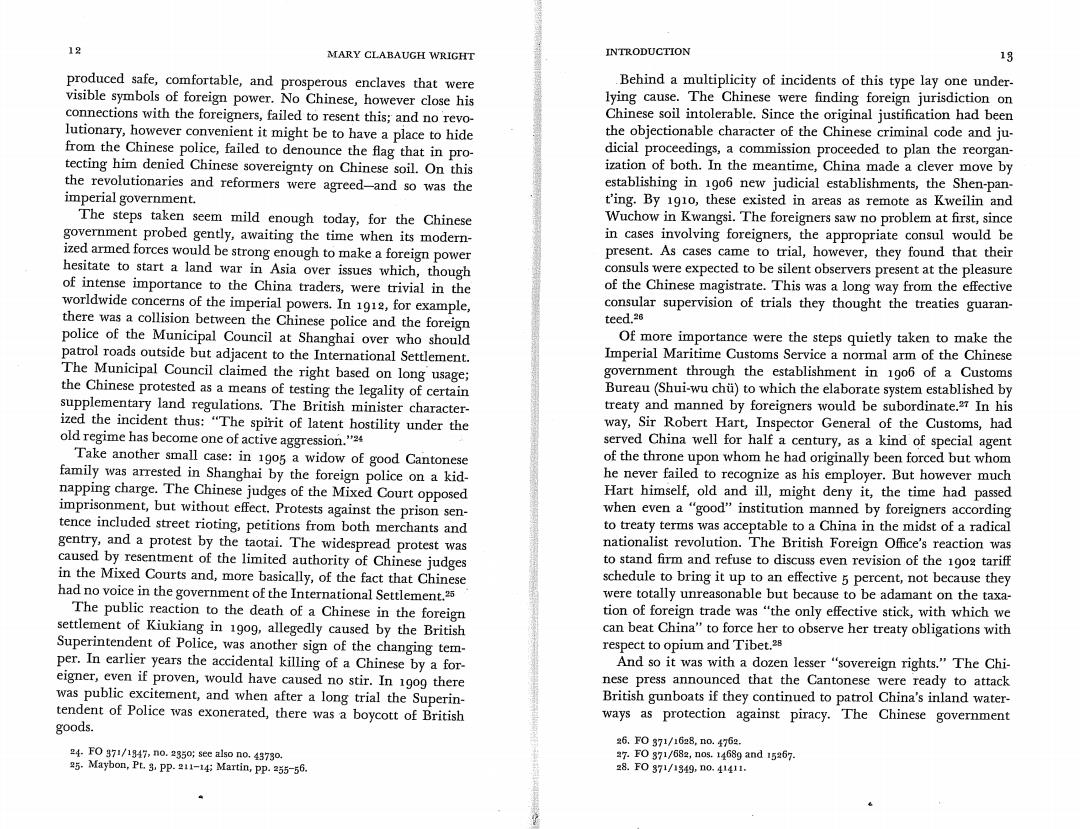
12 MARY CLABAUGH WRIGHT INTRODUCTION 13 produced safe,comfortable,and prosperous enclaves that were Behind a multiplicity of incidents of this type lay one under- visible symbols of foreign power.No Chinese,however close his lying cause.The Chinese were finding foreign jurisdiction on connections with the foreigners,failed to resent this;and no revo- Chinese soil intolerable.Since the original justification had been lutionary,however convenient it might be to have a place to hide the objectionable character of the Chinese criminal code and ju- from the Chinese police,failed to denounce the flag that in pro- dicial proceedings,a commission proceeded to plan the reorgan- tecting him denied Chinese sovereignty on Chinese soil.On this ization of both.In the meantime,China made a clever move by the revolutionaries and reformers were agreed-and so was the establishing in 1906 new judicial establishments,the Shen-pan- imperial government. t'ing.By 1910,these existed in areas as remote as Kweilin and The steps taken seem mild enough today,for the Chinese Wuchow in Kwangsi.The foreigners saw no problem at first,since government probed gently,awaiting the time when its modern- in cases involving foreigners,the appropriate consul would be ized armed forces would be strong enough to make a foreign power present.As cases came to trial,however,they found that their hesitate to start a land war in Asia over issues which,though consuls were expected to be silent observers present at the pleasure of intense importance to the China traders,were trivial in the of the Chinese magistrate.This was a long way from the effective worldwide concerns of the imperial powers.In 1912,for example, consular supervision of trials they thought the treaties guaran- there was a collision between the Chinese police and the foreign teed.26 police of the Municipal Council at Shanghai over who should Of more importance were the steps quietly taken to make the patrol roads outside but adjacent to the International Settlement. Imperial Maritime Customs Service a normal arm of the Chinese The Municipal Council claimed the right based on long usage; government through the establishment in 1g06 of a Customs the Chinese protested as a means of testing the legality of certain Bureau(Shui-wu chu)to which the elaborate system established by supplementary land regulations.The British minister character- treaty and manned by foreigners would be subordinate.27 In his ized the incident thus:"The spirit of latent hostility under the way,Sir Robert Hart,Inspector General of the Customs,had old regime has become one of active aggression. served China well for half a century,as a kind of special agent Take another small case:in 1905 a widow of good Cantonese of the throne upon whom he had originally been forced but whom family was arrested in Shanghai by the foreign police on a kid- he never failed to recognize as his employer.But however much napping charge.The Chinese judges of the Mixed Court opposed Hart himself,old and ill,might deny it,the time had passed imprisonment,but without effect.Protests against the prison sen- when even a"good"institution manned by foreigners according tence included street rioting,petitions from both merchants and to treaty terms was acceptable to a China in the midst of a radical gentry,and a protest by the taotai.The widespread protest was nationalist revolution.The British Foreign Office's reaction was caused by resentment of the limited authority of Chinese judges to stand firm and refuse to discuss even revision of the 1902 tariff in the Mixed Courts and,more basically,of the fact that Chinese schedule to bring it up to an effective 5 percent,not because they had no voice in the government of the International Settlement.25 were totally unreasonable but because to be adamant on the taxa- The public reaction to the death of a Chinese in the foreign tion of foreign trade was "the only effective stick,with which we settlement of Kiukiang in 1909,allegedly caused by the British can beat China"to force her to observe her treaty obligations with Superintendent of Police,was another sign of the changing tem- respect to opium and Tibet.28 per.In earlier years the accidental killing of a Chinese by a for- And so it was with a dozen lesser "sovereign rights."The Chi- eigner,even if proven,would have caused no stir.In 1g09 there nese press announced that the Cantonese were ready to attack was public excitement,and when after a long trial the Superin- British gunboats if they continued to patrol China's inland water- tendent of Police was exonerated,there was a boycott of British ways as protection against piracy.The Chinese government goods. 26.F0371/1628,no.4762. 24-F0371/1g47,n0.235o;see alson0.43730 27.下0371/682,nos.1468gand15a67- 25.Maybon,Pt.3.Pp.1-14 Martin,pp.255-56. 28.F0371/1349,n0.41411
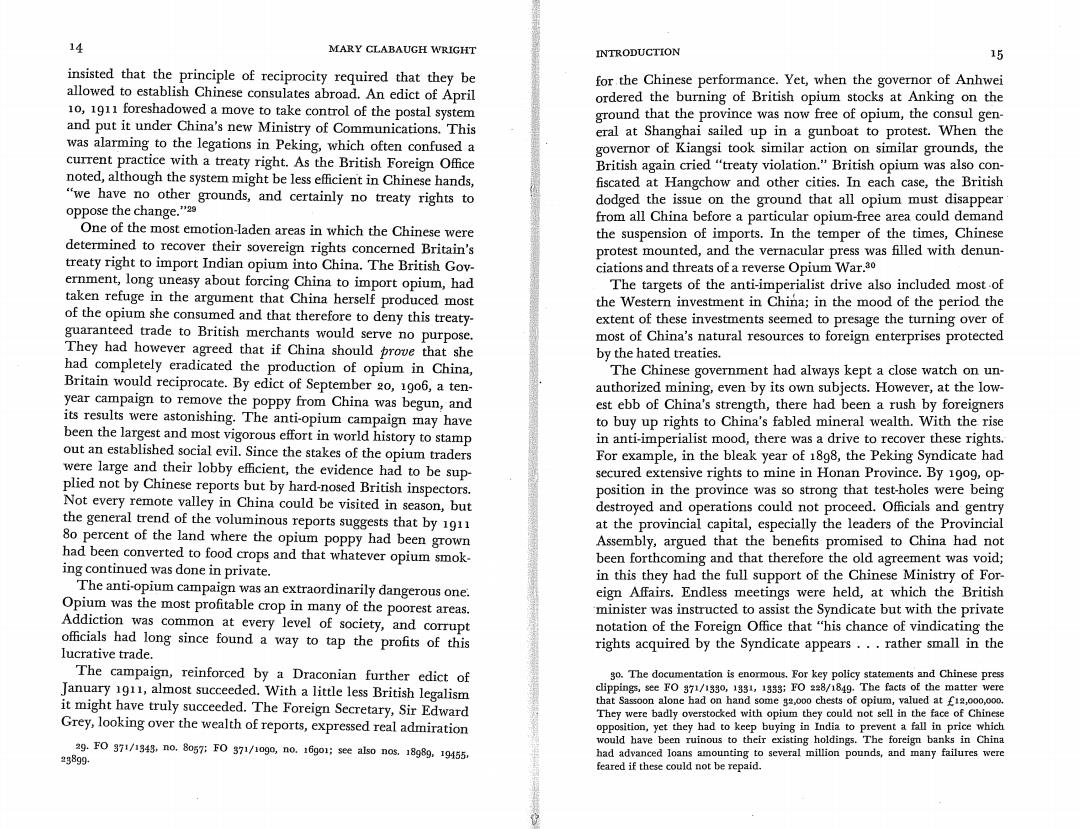
14 MARY CLABAUGH WRIGHT INTRODUCTION 15 insisted that the principle of reciprocity required that they be for the Chinese performance.Yet,when the governor of Anhwei allowed to establish Chinese consulates abroad.An edict of April ordered the burning of British opium stocks at Anking on the 10,1911 foreshadowed a move to take control of the postal system ground that the province was now free of opium,the consul gen- and put it under China's new Ministry of Communications.This eral at Shanghai sailed up in a gunboat to protest.When the was alarming to the legations in Peking,which often confused a governor of Kiangsi took similar action on similar grounds,the current practice with a treaty right.As the British Foreign Office British again cried "treaty violation."British opium was also con- noted,although the system might be less efficient in Chinese hands, fiscated at Hangchow and other cities.In each case,the British "we have no other grounds,and certainly no treaty rights to dodged the issue on the ground that all opium must disappear oppose the change."2 from all China before a particular opium-free area could demand One of the most emotion-laden areas in which the Chinese were the suspension of imports.In the temper of the times,Chinese determined to recover their sovereign rights concerned Britain's protest mounted,and the vernacular press was filled with denun- treaty right to import Indian opium into China.The British Gov- ciations and threats of a reverse Opium War.30 ernment,long uneasy about forcing China to import opium,had The targets of the anti-imperialist drive also included most of taken refuge in the argument that China herself produced most the Western investment in China;in the mood of the period the of the opium she consumed and that therefore to deny this treaty- extent of these investments seemed to presage the turning over of guaranteed trade to British merchants would serve no purpose. most of China's natural resources to foreign enterprises protected They had however agreed that if China should prove that she by the hated treaties. had completely eradicated the production of opium in China, The Chinese government had always kept a close watch on un- Britain would reciprocate.By edict of September 20,1g06,a ten- authorized mining,even by its own subjects.However,at the low- year campaign to remove the poppy from China was begun,and est ebb of China's strength,there had been a rush by foreigners its results were astonishing.The anti-opium campaign may have to buy up rights to China's fabled mineral wealth.With the rise been the largest and most vigorous effort in world history to stamp in anti-imperialist mood,there was a drive to recover these rights. out an established social evil.Since the stakes of the opium traders For example,in the bleak year of 1898,the Peking Syndicate had were large and their lobby efficient,the evidence had to be sup- secured extensive rights to mine in Honan Province.By 1909,op- plied not by Chinese reports but by hard-nosed British inspectors. position in the province was so strong that test-holes were being Not every remote valley in China could be visited in season,but destroyed and operations could not proceed.Officials and gentry the general trend of the voluminous reports suggests that by 1911 at the provincial capital,especially the leaders of the Provincial 8o percent of the land where the opium poppy had been grown Assembly,argued that the benefits promised to China had not had been converted to food crops and that whatever opium smok- been forthcoming and that therefore the old agreement was void; ing continued was done in private. in this they had the full support of the Chinese Ministry of For- The anti-opium campaign was an extraordinarily dangerous one. eign Affairs.Endless meetings were held,at which the British Opium was the most profitable crop in many of the poorest areas. minister was instructed to assist the Syndicate but with the private Addiction was common at every level of society,and corrupt notation of the Foreign Office that "his chance of vindicating the officials had long since found a way to tap the profits of this rights acquired by the Syndicate appears...rather small in the lucrative trade. The campaign,reinforced by a Draconian further edict of 30.The documentation is enormous.For key policy statements and Chinese press January 1911,almost succeeded.With a little less British legalism clippings,see FO 371/1330,1331,1333;FO 228/1849.The facts of the matter were it might have truly succeeded.The Foreign Secretary,Sir Edward that Sassoon alone had on hand some g2,o00 chests of opium,valued at fis,o00,000 They were badly overstocked with opium they could not sell in the face of Chinese Grey,looking over the wealth of reports,expressed real admiration opposition,yet they had to keep buying in India to prevent a fall in price which 29.F0371/h343,n0.8057:F0371/1og0,n0.16go1;see als0n0s,18g89.19455, would have been ruinous to their existing holdings.The foreign banks in China 238g9. had advanced loans amounting to several million pounds,and many failures were feared if these could not be repaid
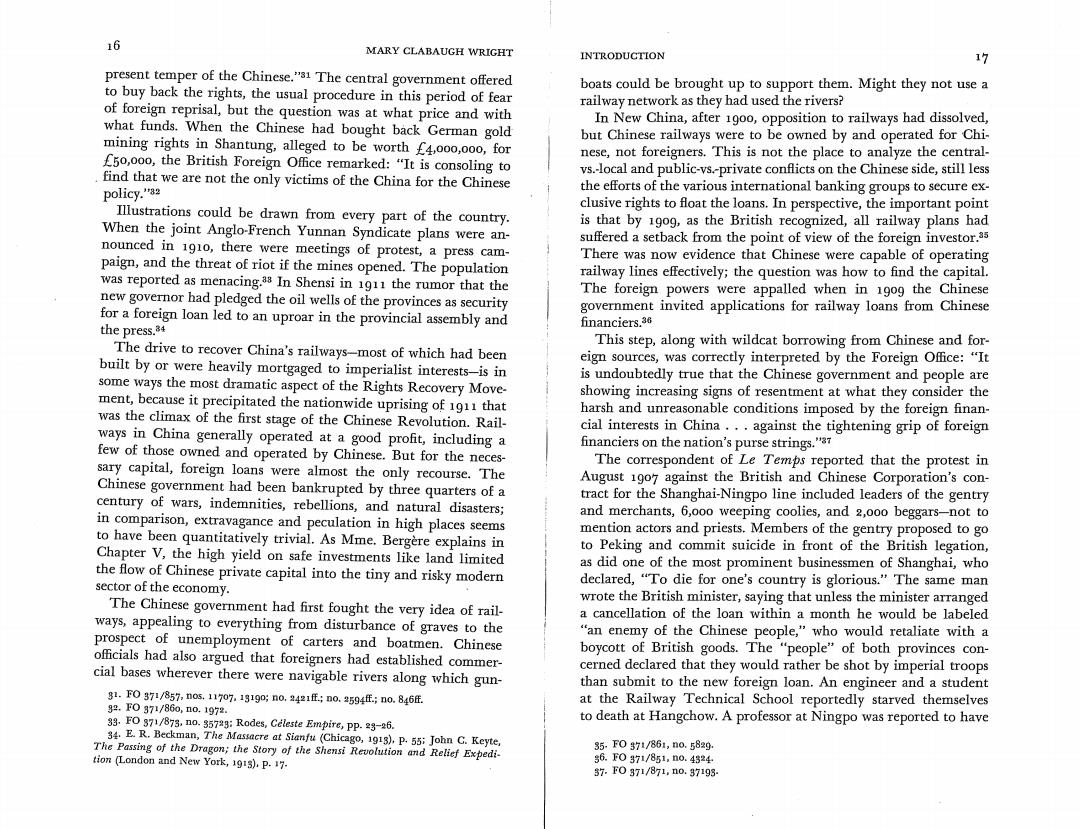
16 MARY CLABAUGH WRIGHT INTRODUCTION 17 present temper of the Chinese."s1 The central government offered to buy back the rights,the usual procedure in this period of fear boats could be brought up to support them.Might they not use a of foreign reprisal,but the question was at what price and with railway network as they had used the rivers? what funds.When the Chinese had bought back German gold In New China,after 1g00,opposition to railways had dissolved, mining rights in Shantung,alleged to be worth f4,o00,000,for but Chinese railways were to be owned by and operated for Chi- L50,o00,the British Foreign Office remarked:"It is consoling to nese,not foreigners.This is not the place to analyze the central- find that we are not the only victims of the China for the Chinese vs.local and public-vs-private conflicts on the Chinese side,still less policy." the efforts of the various international banking groups to secure ex- Illustrations could be drawn from every part of the country. clusive rights to float the loans.In perspective,the important point When the joint Anglo-French Yunnan Syndicate plans were an- is that by 1g09,as the British recognized,all railway plans had nounced in 1910,there were meetings of protest,a press cam- suffered a setback from the point of view of the foreign investor.35 paign,and the threat of riot if the mines opened.The population There was now evidence that Chinese were capable of operating was reported as menacing.a8 In Shensi in 1911 the rumor that the railway lines effectively;the question was how to find the capital. new governor had pledged the oil wells of the provinces as security The foreign powers were appalled when in 1909 the Chinese for a foreign loan led to an uproar in the provincial assembly and government invited applications for railway loans from Chinese the press.4 financiers.36 The drive to recover China's railways-most of which had been This step,along with wildcat borrowing from Chinese and for- built by or were heavily mortgaged to imperialist interests-is in eign sources,was correctly interpreted by the Foreign Office:"It some ways the most dramatic aspect of the Rights Recovery Move- is undoubtedly true that the Chinese government and people are ment,because it precipitated the nationwide uprising of 1911 that showing increasing signs of resentment at what they consider the was the climax of the first stage of the Chinese Revolution.Rail- harsh and unreasonable conditions imposed by the foreign finan- ways in China generally operated at a good profit,including a cial interests in China...against the tightening grip of foreign few of those owned and operated by Chinese.But for the neces- financiers on the nation's purse strings." sary capital,foreign loans were almost the only recourse.The The correspondent of Le Temps reported that the protest in Chinese government had been bankrupted by three quarters of a August 1907 against the British and Chinese Corporation's con- century of wars,indemnities,rebellions,and natural disasters; tract for the Shanghai-Ningpo line included leaders of the gentry in comparison,extravagance and peculation in high places seems and merchants,6,000 weeping coolies,and 2,000 beggars-not to to have been quantitatively trivial.As Mme.Bergere explains in mention actors and priests.Members of the gentry proposed to go Chapter V,the high yield on safe investments like land limited to Peking and commit suicide in front of the British legation, the flow of Chinese private capital into the tiny and risky modern as did one of the most prominent businessmen of Shanghai,who sector of the economy. declared,"To die for one's country is glorious."The same man The Chinese government had first fought the very idea of rail- wrote the British minister,saying that unless the minister arranged ways,appealing to everything from disturbance of graves to the a cancellation of the loan within a month he would be labeled prospect of unemployment of carters and boatmen.Chinese "an enemy of the Chinese people,"who would retaliate with a officials had also argued that foreigners had established commer- boycott of British goods.The "people"of both provinces con- cial bases wherever there were navigable rivers along which gun- cerned declared that they would rather be shot by imperial troops than submit to the new foreign loan.An engineer and a student 31.F0371/857,nos,11707,1390;n0.2421f:n0.2594f:n0.846f. at the Railway Technical School reportedly starved themselves 3a.F0371/860,no.1972. 33.FO 371/873.no.57:Rodes,Celeste Empire,pp.-6. to death at Hangchow.A professor at Ningpo was reported to have 34.E.R.Beckman,The Massacre at Sianfu(Chicago,1913).p.55;John C.Keyte, The Passing of the Dragon;the Story of the Shensi Revolution and Relief Expedi- 35.F0371/861,n0.5829 tion (London and New York,1913).P.17- s6.F0371/851,n0.4324 37.F0371/871,n0.37193